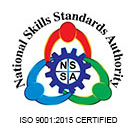National Skills Standard Authority in Brief
- National Skills Standard Authority in Brief
NSSA was established in 2007 comprising of various stakeholders (Government Ministries and private organizations) as part of the ASEAN Skills Recognition Project within ASEAN countries towards the implementation of the ASEAN Economic Community (AEC). Since then, Ministry of Labour Immigration and Population has been acting as a focal ministry to further strengthening NSSA with the aim to establish National Unified Skills Development, Recognition and Certification System as a provision for skilled labour movement within ASEAN principally revolve around Mutual Recognition of Skills (MRS). NSSA has been accredited ISO 9001: 2015, Quality Management System in February 2019.
- Formation of NSSA Committees
As a regulatory body stipulated in the Employment and Skills Development Law (enacted in 2013), NSSA was formed with main committees i.e. Assessment and Certification Committee (ACC) Chaired by MOI (now MOPFI) in 2012, the Training Committee Chaired by DTVET/MOE in 2019 and Competency development Committee consist of 15 sectorial committees Chaired by 15 respective ministries and private sectors in 2009, namely Metal and Engineering Sector, Construction Sector, Woodworking Sector, Agriculture Sector, Livestock and Fishery Sector, Transport Sector, Mining Sector, Health Sector, Social Welfare Sector, Manufacturing Sector, Commercial Sector, Hotel and Tourism Sector, Oil and Gas Sector, Electrical Engineering Sector and IT Sector. NSSA is implementing to establish Skills Development Fund committee.
- Developing Occupational Competency Standards
NSSA identifies and promulgates priority occupations to develop NOCS for the most demanded occupations in the labour market in order to accredit the skills of existing workforce and potential workers. National Skills Qualification Framework has also been defined with 4 levels: level 1 for semi-skilled workers, level 2 for skilled workers, level 3 for advanced skilled workers and level 4 for supervisory. NOCSs have been developed and approved by NSSA through collaboration with the respective sectorial committee, private organizations and professional associations as stated knowledge, skill and ability in Qualification Framework.
- Skill Assessments and Recognition Programs
The role of skilled workers in the labor market plays a key role in the development of the country's market economy. Skills development process in human resource development is contributing to the country's economic development. Skill Recognition Program is a redriving activity for skills development mechanism and it aims to be sustainable beneficial for more job opportunities and more improvement of skilled workers’ performance. NSSA has therefore piloted a Skills Recognition programme in 2014 with the support of GIZ TVET programme and introduced appropriate approaches and methods as workforce development tools. Since 2015, Swisscontact and other development partners, private sector associations and companies have been supporting to the workforce skills development activities. As of 2020 July, over 16,000 NSSA certifications mainly on Level 1 and 2 for those, who are in the workforce and have already acquired their occupational skills through experience and learning on-the-job, have been awarded in over 30 demanded occupational areas. NSSA is accrediting Assessment Centers and Competency-Based Curriculum Training Centers depending on industry need at respectively State and Region. Assessment Centers are accredited by Assessment and Certification Committee with approval of NSSA.
- National Cooperation
NSSA is implementing and collaborating with concerned Ministries such as Ministry of Planning, Finance and Industry, Ministry of Agriculture, Livestock and Fishery, Ministry of Commerce, Ministry of Transport and Communication, Ministry of Natural Resources and Environmental Conservation, Ministry of Electricity and Energy, Ministry of Education, Ministry of Health and Sport, Ministry of Construction, Ministry of Social Welfare, Relief and Resettlement, Ministry of Hotel and Tourism, Employer Organizations and Federations such as UMFCCI, Myanmar Garment Manufacturers Association, Myanmar Industries Association, Myanmar Federation of Mining Association, Myanmar Computer Industry Association, Myanmar Construction Entrepreneurs Association, Myanmar Tourism Federation, Textile and Loom Association (Mandalay), Myanmar Private Hospitals’ Association, Myanmar Livestock Federation, Bagan Lacqerware Society, Professional Associations such as Myanmar Engineering Society, Myanmar Nursing and Midwife Council, Myanmar Hospitality Professionals Association၊ Myanmar Beauty and Hair Professional Association, and Development Partners such as GIZ, Swisscontact, JICA, ILO, IOM, ADB, Lux Development Agency and others to develop Occupational Competency Standards, to train skilled workers and to assess and certify skilled workers for skills development program of existing workforce.
- Regional Cooperation
The ASEAN Qualification Reference Framework (AQRF) was endorsed by the ASEAN Economic Ministers (AEM); the ASEAN Education Ministers (ASED); and the ASEAN Labour Ministers (ALMM) in 2014. The AQRF aimed to support free flow of skilled labour (through harmonization and standardization) within the region, as indicated in the ASEAN Economic Community (AEC) 2015 Blueprint; and ASEAN Socio-Cultural Community (ASCC) 2015 Blueprint which seeks “to establish national skills frameworks as an incremental approach towards an ASEAN skills recognition framework”.
AQRF have two parts Mutual Recognition Arrangement (MRA) and Mutual Recognition of Skills (MRS). MRA for skilled personnel targets 8 categories of mostly high-skilled occupations and MRS targets middle-to-low skill categories of workers.
Thailand led in the MRS pilot implementation in collaboration with CLM countries in the following areas;
- Bricklaying and Plastering - Thailand with Lao PDR, Cambodia, and Myanmar
- Building Electrical Wiring - Thailand with Cambodia
- Sewing Machine Operator - Thailand with Myanmar
Myanmar and Thailand are discussing these two occupations for benchmarking of National Competency Standard, Assessment and Certification.
